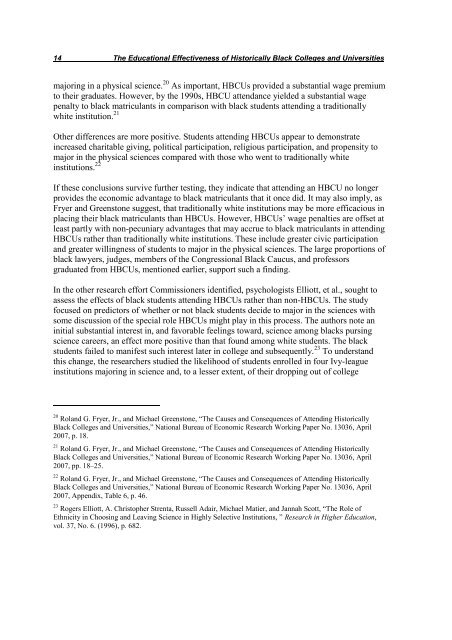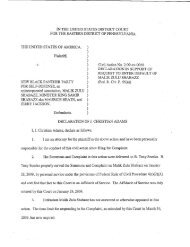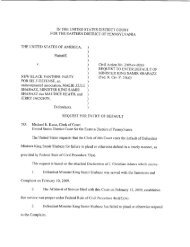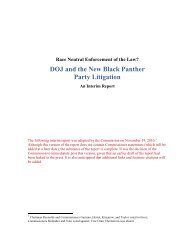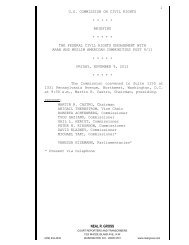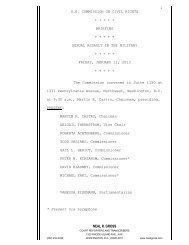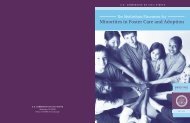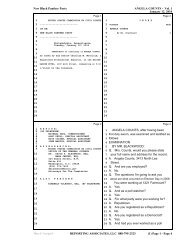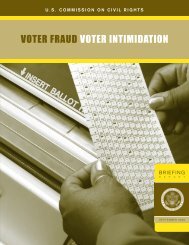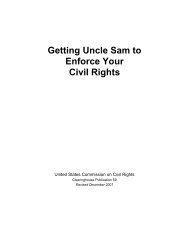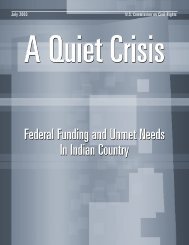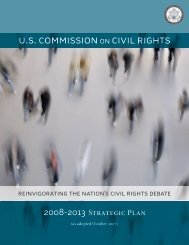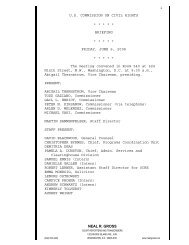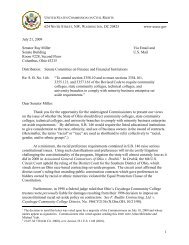The Educational Effectiveness of Historically Black Colleges and ...
The Educational Effectiveness of Historically Black Colleges and ...
The Educational Effectiveness of Historically Black Colleges and ...
You also want an ePaper? Increase the reach of your titles
YUMPU automatically turns print PDFs into web optimized ePapers that Google loves.
14 <strong>The</strong> <strong>Educational</strong> <strong>Effectiveness</strong> <strong>of</strong> <strong>Historically</strong> <strong>Black</strong> <strong>Colleges</strong> <strong>and</strong> Universities<br />
majoring in a physical science. 20 As important, HBCUs provided a substantial wage premium<br />
to their graduates. However, by the 1990s, HBCU attendance yielded a substantial wage<br />
penalty to black matriculants in comparison with black students attending a traditionally<br />
white institution. 21<br />
Other differences are more positive. Students attending HBCUs appear to demonstrate<br />
increased charitable giving, political participation, religious participation, <strong>and</strong> propensity to<br />
major in the physical sciences compared with those who went to traditionally white<br />
institutions. 22<br />
If these conclusions survive further testing, they indicate that attending an HBCU no longer<br />
provides the economic advantage to black matriculants that it once did. It may also imply, as<br />
Fryer <strong>and</strong> Greenstone suggest, that traditionally white institutions may be more efficacious in<br />
placing their black matriculants than HBCUs. However, HBCUs’ wage penalties are <strong>of</strong>fset at<br />
least partly with non-pecuniary advantages that may accrue to black matriculants in attending<br />
HBCUs rather than traditionally white institutions. <strong>The</strong>se include greater civic participation<br />
<strong>and</strong> greater willingness <strong>of</strong> students to major in the physical sciences. <strong>The</strong> large proportions <strong>of</strong><br />
black lawyers, judges, members <strong>of</strong> the Congressional <strong>Black</strong> Caucus, <strong>and</strong> pr<strong>of</strong>essors<br />
graduated from HBCUs, mentioned earlier, support such a finding.<br />
In the other research effort Commissioners identified, psychologists Elliott, et al., sought to<br />
assess the effects <strong>of</strong> black students attending HBCUs rather than non-HBCUs. <strong>The</strong> study<br />
focused on predictors <strong>of</strong> whether or not black students decide to major in the sciences with<br />
some discussion <strong>of</strong> the special role HBCUs might play in this process. <strong>The</strong> authors note an<br />
initial substantial interest in, <strong>and</strong> favorable feelings toward, science among blacks pursing<br />
science careers, an effect more positive than that found among white students. <strong>The</strong> black<br />
students failed to manifest such interest later in college <strong>and</strong> subsequently. 23 To underst<strong>and</strong><br />
this change, the researchers studied the likelihood <strong>of</strong> students enrolled in four Ivy-league<br />
institutions majoring in science <strong>and</strong>, to a lesser extent, <strong>of</strong> their dropping out <strong>of</strong> college<br />
20 Rol<strong>and</strong> G. Fryer, Jr., <strong>and</strong> Michael Greenstone, “<strong>The</strong> Causes <strong>and</strong> Consequences <strong>of</strong> Attending <strong>Historically</strong><br />
<strong>Black</strong> <strong>Colleges</strong> <strong>and</strong> Universities,” National Bureau <strong>of</strong> Economic Research Working Paper No. 13036, April<br />
2007, p. 18.<br />
21 Rol<strong>and</strong> G. Fryer, Jr., <strong>and</strong> Michael Greenstone, “<strong>The</strong> Causes <strong>and</strong> Consequences <strong>of</strong> Attending <strong>Historically</strong><br />
<strong>Black</strong> <strong>Colleges</strong> <strong>and</strong> Universities,” National Bureau <strong>of</strong> Economic Research Working Paper No. 13036, April<br />
2007, pp. 18–25.<br />
22 Rol<strong>and</strong> G. Fryer, Jr., <strong>and</strong> Michael Greenstone, “<strong>The</strong> Causes <strong>and</strong> Consequences <strong>of</strong> Attending <strong>Historically</strong><br />
<strong>Black</strong> <strong>Colleges</strong> <strong>and</strong> Universities,” National Bureau <strong>of</strong> Economic Research Working Paper No. 13036, April<br />
2007, Appendix, Table 6, p. 46.<br />
23 Rogers Elliott, A. Christopher Strenta, Russell Adair, Michael Matier, <strong>and</strong> Jannah Scott, “<strong>The</strong> Role <strong>of</strong><br />
Ethnicity in Choosing <strong>and</strong> Leaving Science in Highly Selective Institutions, ” Research in Higher Education,<br />
vol. 37, No. 6. (1996), p. 682.


